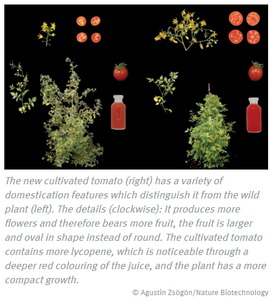
International Team of Biologists Create New Tomato Using Genome Editing
October 3, 2018| |
 For the first time ever, an international team of scientists from Brazil, the United States, and Germany has created a new crop from a wild plant within a single generation using the modern genome editing process CRISPR-Cas9.
For the first time ever, an international team of scientists from Brazil, the United States, and Germany has created a new crop from a wild plant within a single generation using the modern genome editing process CRISPR-Cas9.
The team used Solanum pimpinellifolium as the parent plant species, a wild tomato relative from South America, and the progenitor of modern cultivated tomato. The wild plant's fruits are as small as the size of peas and the yield is low, but are more aromatic and contains more lycopene than modern tomatoes.
The researchers modified the wild tomato using "multiplex CRISPR-Cas9" in such a way that offspring plants bore small genetic modifications in six genes that were recognized by researchers as the genetic key to features in the domesticated tomato. The modified wild tomato bears fruits three times larger, which corresponds to the size of a cherry tomato. There is now 10 times the number of fruits, and their shape is more oval than the round wild fruit. This property is popular because, when it rains, round fruits split open faster than oval fruits. Another important new property is that the lycopene content in the new tomato is more than twice as high as in the wild parent.
For more details about this research, read the news release from the University of Münster.
| |
Biotech Updates is a weekly newsletter of ISAAA, a not-for-profit organization. It is distributed for free to over 22,000 subscribers worldwide to inform them about the key developments in biosciences, especially in biotechnology. Your support will help us in our mission to feed the world with knowledge. You can help by donating as little as $10.
-
See more articles:
-
News from Around the World
- UBIC Initiates Efforts to Integrate Biosciences into Uganda's Education System
- International Team of Biologists Create New Tomato Using Genome Editing
- Gene Discovered is 'Firing Pin' for Plant Immunity
- Researchers Find Mechanism to Help Engineer Plants to Make More Oil
- Research Shows Daily Morning Gene Activity Leads to Flowering
- ITIF Files Petition to Ban Non-GMO Labels
- Scientists Design a More Productive Maize to Cope with Future Climates
- Filipino Farmers Express Interest to Plant Bt Eggplant
- Int'l Grains Council Forecasts Increase in Spain's Grains Production in 2018-19
- Researchers Discover Protein Prevents Plants from Premature Flowering
- EFSA Publishes Risk Assessment of New Sequencing Information for GM Soybean BPS‐CV127‐9
-
Research Highlights
- Scientists Identify Kinases Involved in Pineapple CAM Photosynthesis
- Gene Expression During Drought Determined in Papaya
-
Beyond Crop Biotech
- Scientists Wipe Out a Mosquito Population Through Genome-editing
-
Plant
- RNAi Improves CRISPR-Cas9 Efficiency and Selection
- Scientists Use CRISPR-Cas9 to Improve Grain Yield in Rice
- Gene Gun Allows Transient Expression of CRISPR-Cas9 in Wheat
- CRISPR Helps Groundcherry Domestication
-
Read the latest: - Biotech Updates (November 12, 2025)
- Gene Editing Supplement (October 29, 2025)
- Gene Drive Supplement (February 22, 2023)
-
Subscribe to BU: - Share
- Tweet
